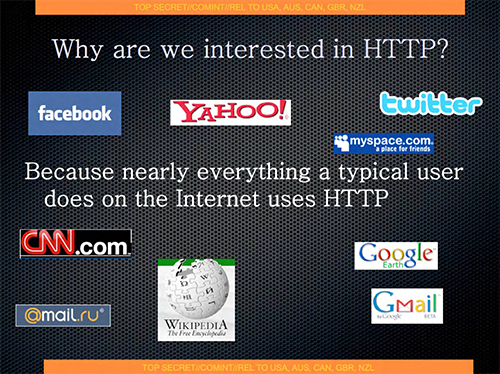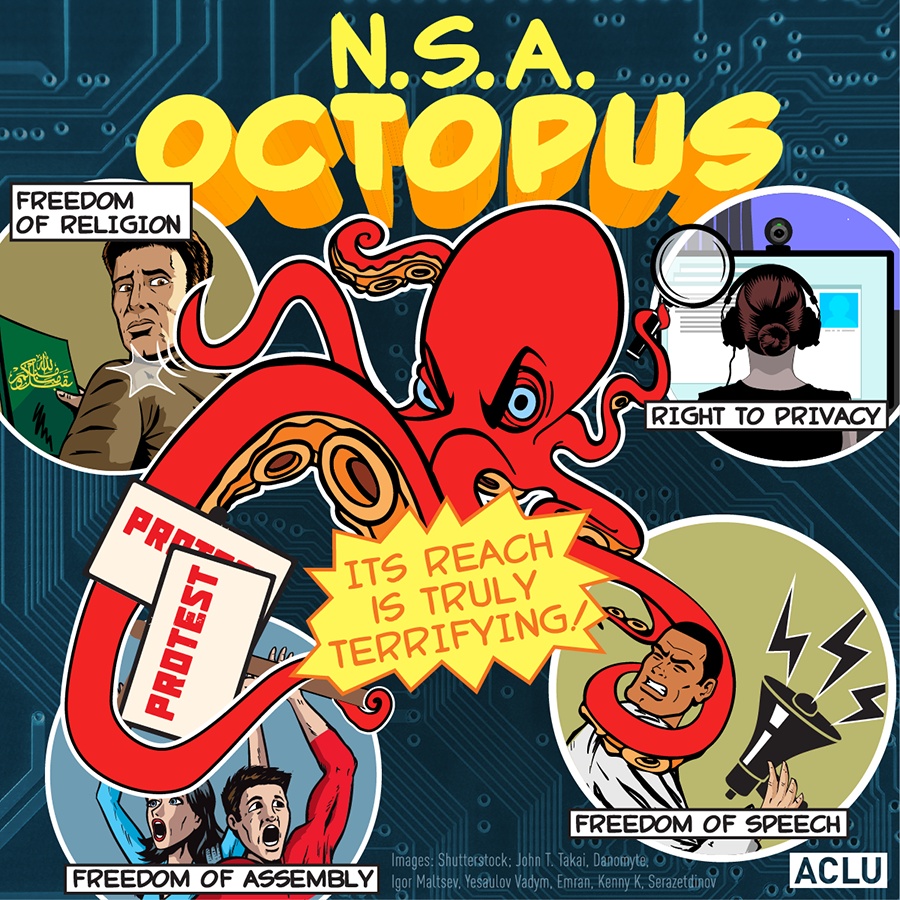Wikimedia vs. NSA: Challenge to Mass Surveillance under the FISA Amendments Act
WHISTLEBLOWING - SURVEILLANCE, 16 Mar 2015
ACLU-American Civil Liberties Union – TRANSCEND Media Service
12 Mar 2015 – The ACLU has filed a lawsuit challenging the constitutionality of the NSA’s mass interception and searching of Americans’ international communications. At issue is the NSA’s “upstream” surveillance, through which the U.S. government monitors almost all international – and many domestic – text-based communications. The ACLU’s lawsuit, filed in March 2015 in the U.S. District Court for the District of Maryland, is brought on behalf of nearly a dozen educational, legal, human rights, and media organizations that collectively engage in hundreds of billions of sensitive Internet communications and have been harmed by NSA surveillance.
The plaintiffs in the lawsuit are: Wikimedia Foundation, The National Association of Criminal Defense Lawyers, Human Rights Watch, Amnesty International USA, PEN American Center, Global Fund for Women, The Nation Magazine, The Rutherford Institute, and The Washington Office on Latin America. These plaintiffs’ sensitive communications have been copied, searched, and likely retained by the NSA. Upstream surveillance hinders the plaintiffs’ ability to ensure the basic confidentiality of their communications with crucial contacts abroad – among them journalists, colleagues, clients, victims of human rights abuses, and the tens of millions of people who read and edit Wikipedia pages.
Upstream surveillance, which the government claims is authorized by the FISA Amendments Act of 2008, is designed to ensnare all of Americans’ international communications, including emails, web-browsing content, and search engine queries. It is facilitated by devices installed, with the help of companies like Verizon and AT&T, directly on the internet “backbone” – the network of high-capacity cables, switches, and routers across which Internet traffic travels.
The NSA intercepts and copies private communications in bulk while they are in transit, and then searches their contents using tens of thousands of keywords associated with NSA targets. These targets, chosen by intelligence analysts, are never approved by any court, and the limitations that do exist are weak and riddled with exceptions. Under the FAA, the NSA may target any foreigner outside the United States believed likely to communicate “foreign intelligence information” – a pool of potential targets so broad that it encompasses journalists, academic researchers, corporations, aid workers, business persons, and others who are not suspected of any wrongdoing.
See a larger version of this infographic.
Through its general, indiscriminate searches and seizures of the plaintiffs’ communications, upstream surveillance invades their Fourth Amendment right to privacy, infringes on their First Amendment rights to free expression and association, and exceeds the statutory limits of the FAA itself. The nature of plaintiffs’ work and the law’s permissive guidelines for targeting make it likely that the NSA is also retaining and reading their communications, from email exchanges between Amnesty staff and activists, to Wikipedia browsing by readers abroad.
The ACLU litigated an earlier challenge to surveillance conducted under the FAA – Clapper v. Amnesty – which was filed less than an hour after President Bush signed the FAA into law in 2008. In a 5-4 vote, the Supreme Court dismissed the case in February 2013 on the grounds that the plaintiffs could not prove they had been spied on. Edward Snowden has said that the ruling contributed to his decision to expose the full scope of NSA surveillance a few months later. Among his disclosures was upstream surveillance, the existence of which was later confirmed by the government.
Our clients advocate for human and civil rights, unimpeded access to knowledge, and a free press. Their work is essential to a functioning democracy. When their sensitive and privileged communications are monitored by the U.S. government, they cannot work freely and their effectiveness is curtailed – to the detriment of Americans and others around the world.
DISCLAIMER: The statements, views and opinions expressed in pieces republished here are solely those of the authors and do not necessarily represent those of TMS. In accordance with title 17 U.S.C. section 107, this material is distributed without profit to those who have expressed a prior interest in receiving the included information for research and educational purposes. TMS has no affiliation whatsoever with the originator of this article nor is TMS endorsed or sponsored by the originator. “GO TO ORIGINAL” links are provided as a convenience to our readers and allow for verification of authenticity. However, as originating pages are often updated by their originating host sites, the versions posted may not match the versions our readers view when clicking the “GO TO ORIGINAL” links. This site contains copyrighted material the use of which has not always been specifically authorized by the copyright owner. We are making such material available in our efforts to advance understanding of environmental, political, human rights, economic, democracy, scientific, and social justice issues, etc. We believe this constitutes a ‘fair use’ of any such copyrighted material as provided for in section 107 of the US Copyright Law. In accordance with Title 17 U.S.C. Section 107, the material on this site is distributed without profit to those who have expressed a prior interest in receiving the included information for research and educational purposes. For more information go to: http://www.law.cornell.edu/uscode/17/107.shtml. If you wish to use copyrighted material from this site for purposes of your own that go beyond ‘fair use’, you must obtain permission from the copyright owner.
Read more
Click here to go to the current weekly digest or pick another article:
WHISTLEBLOWING - SURVEILLANCE:

